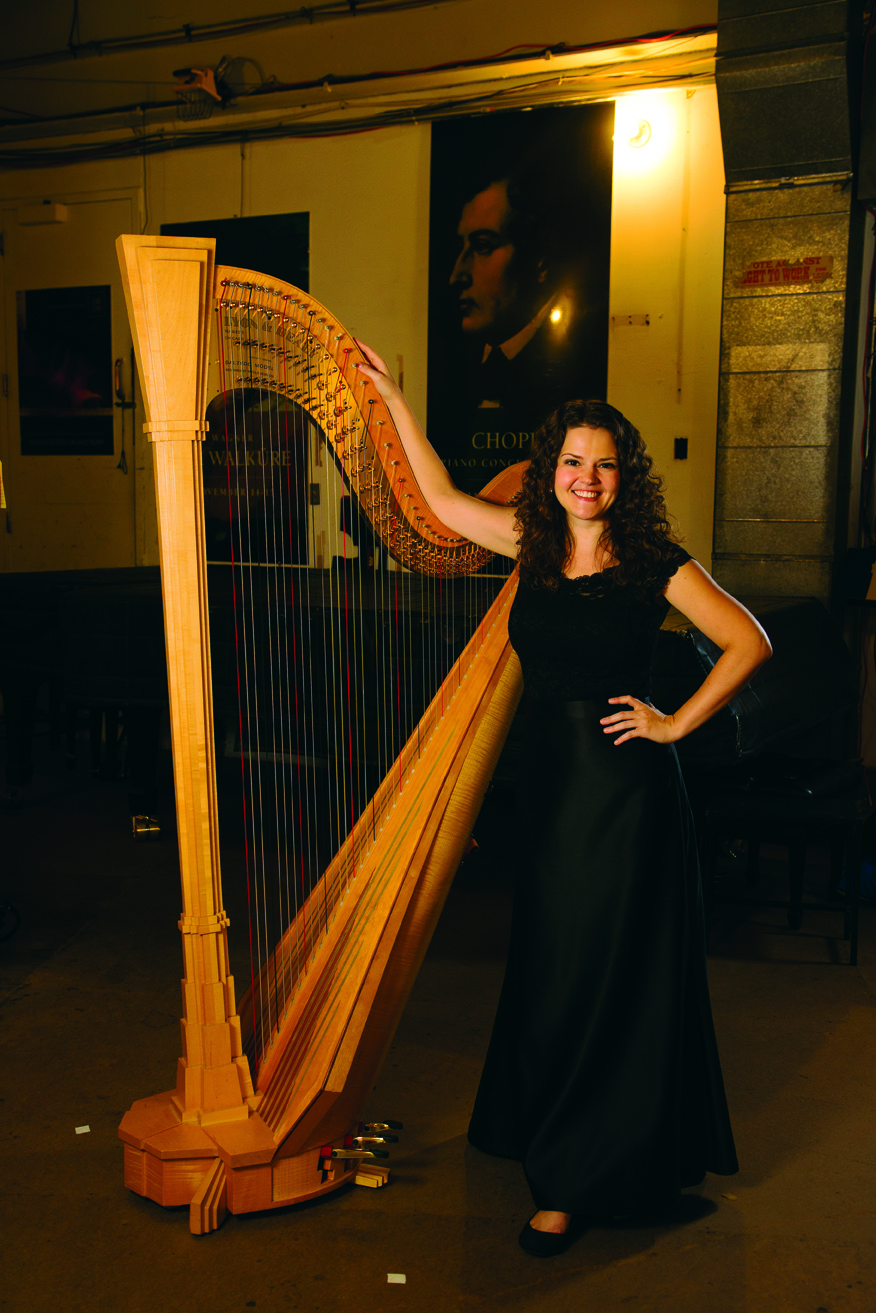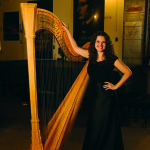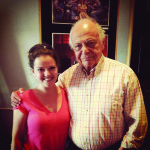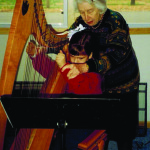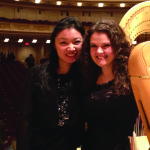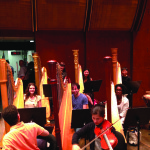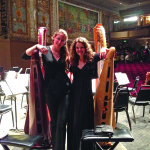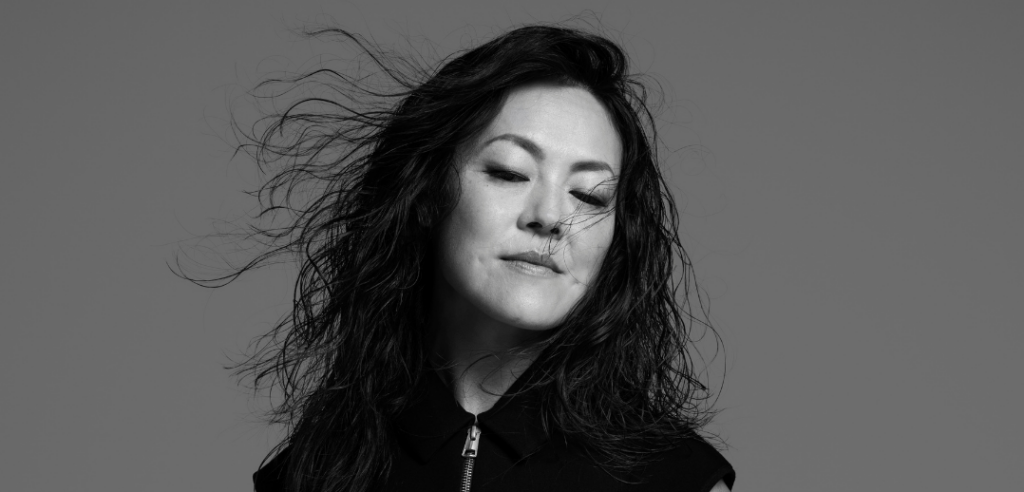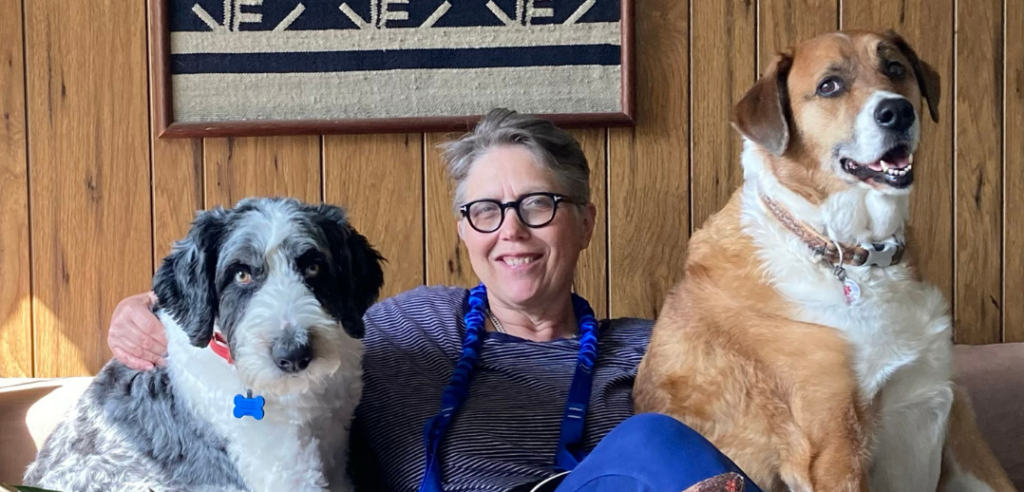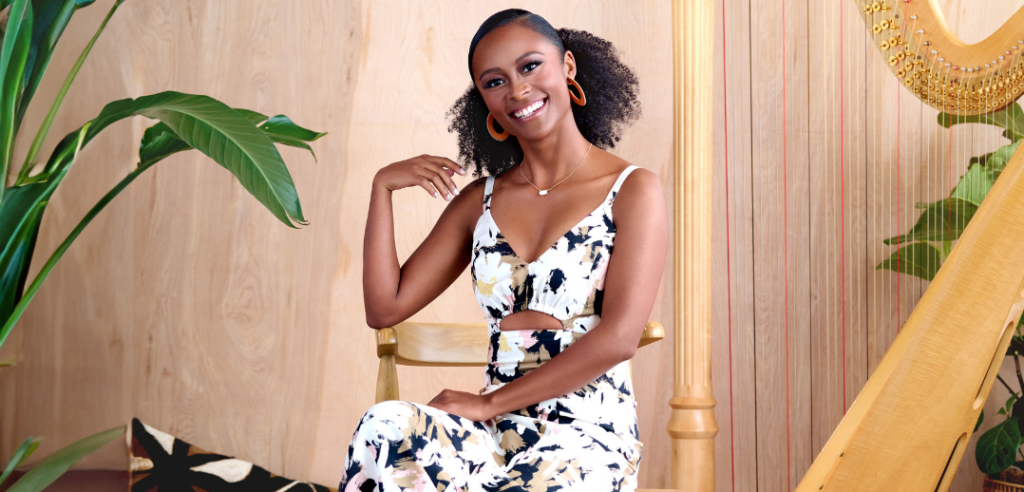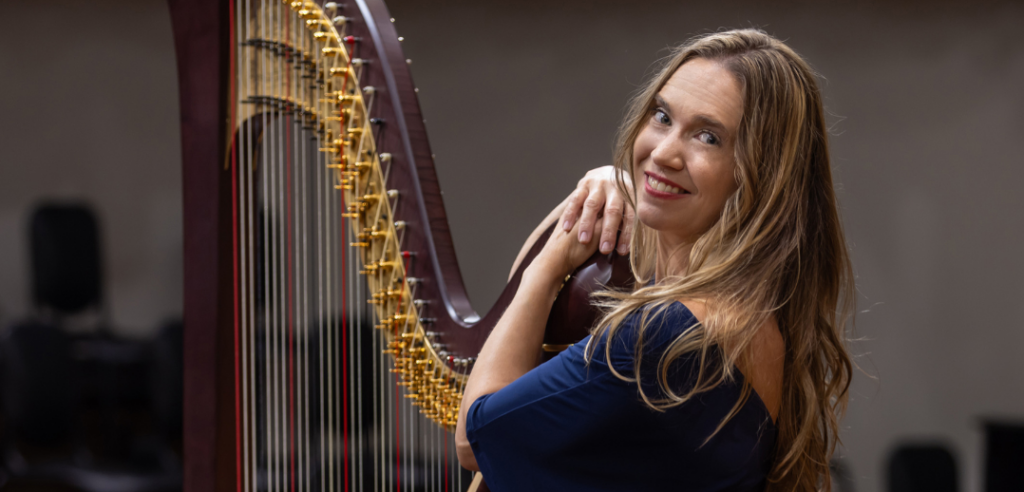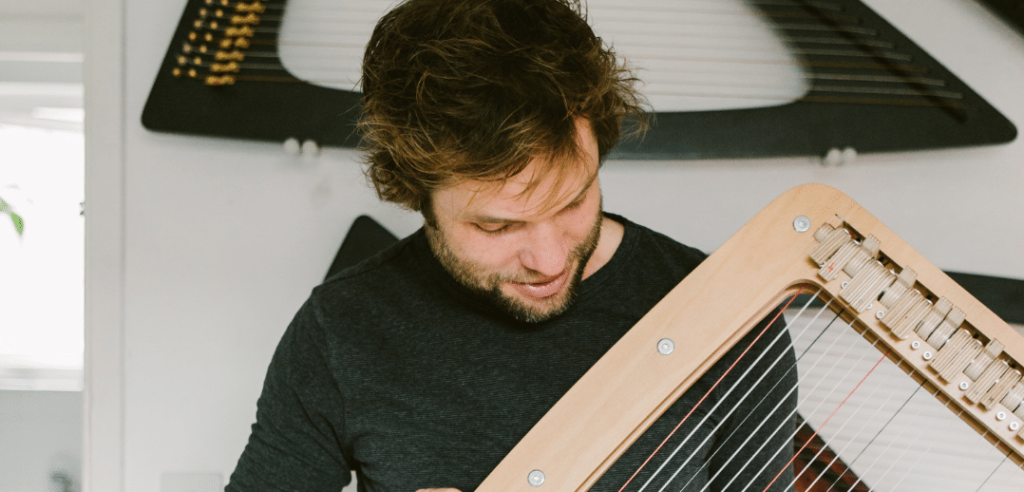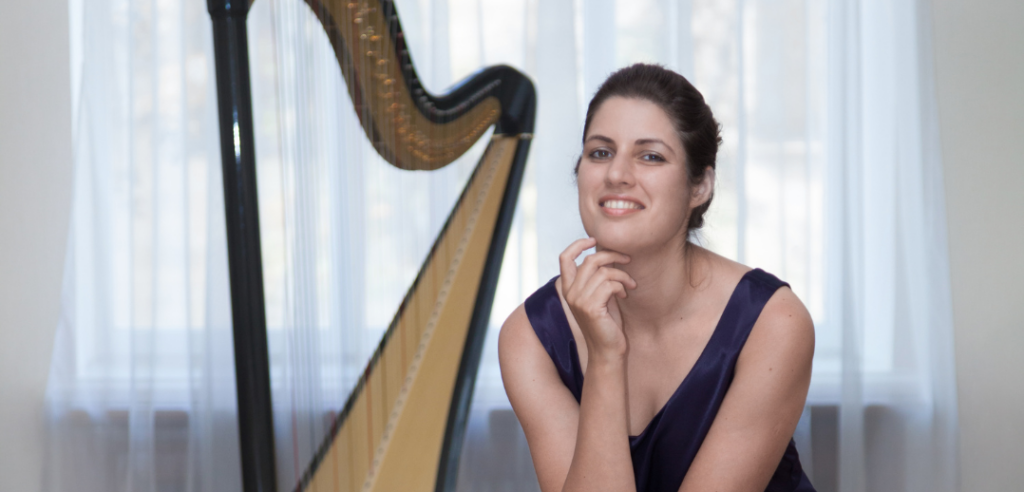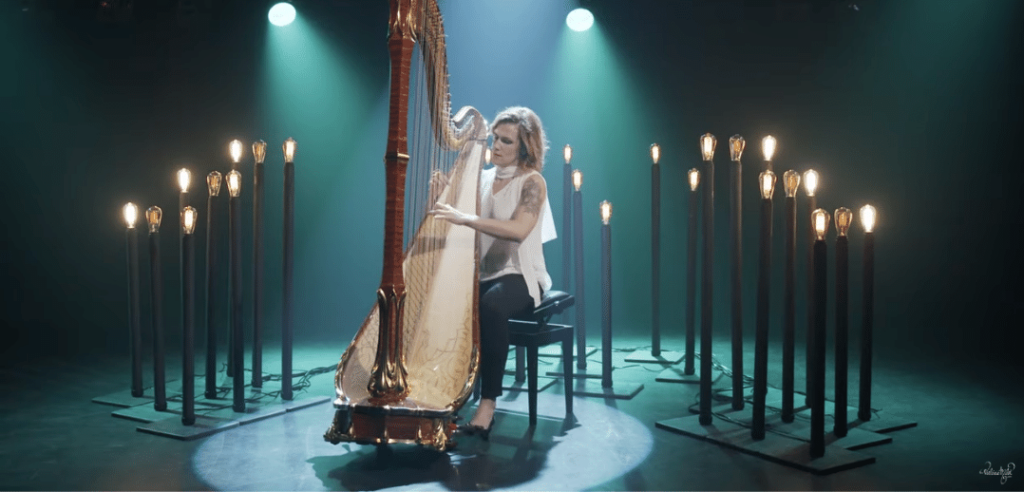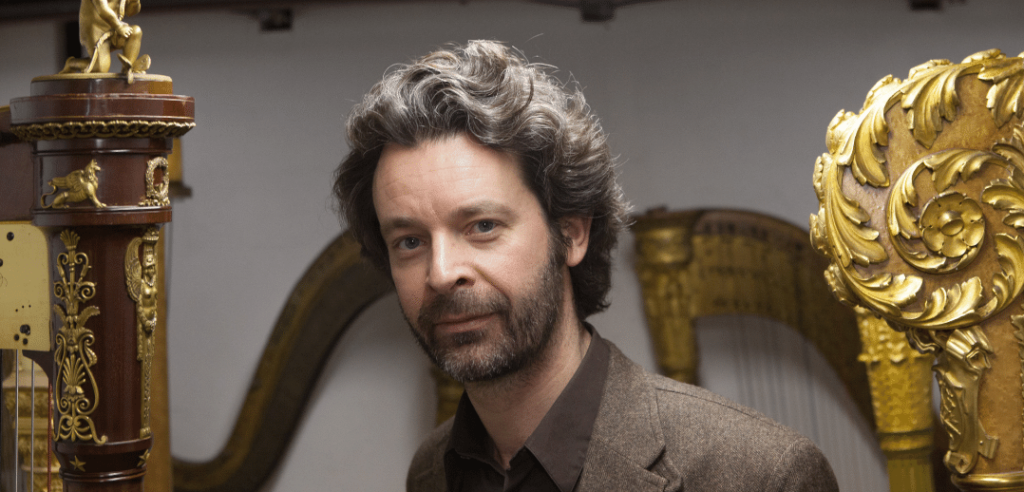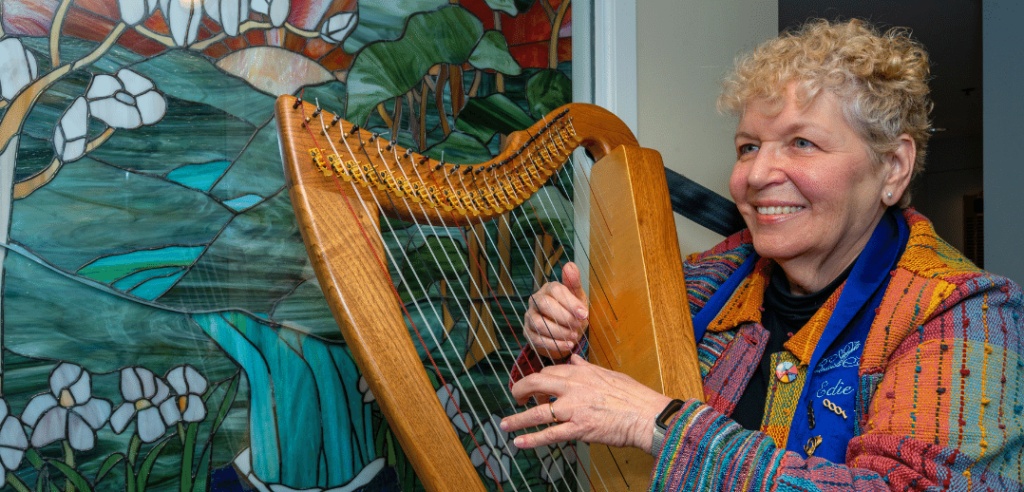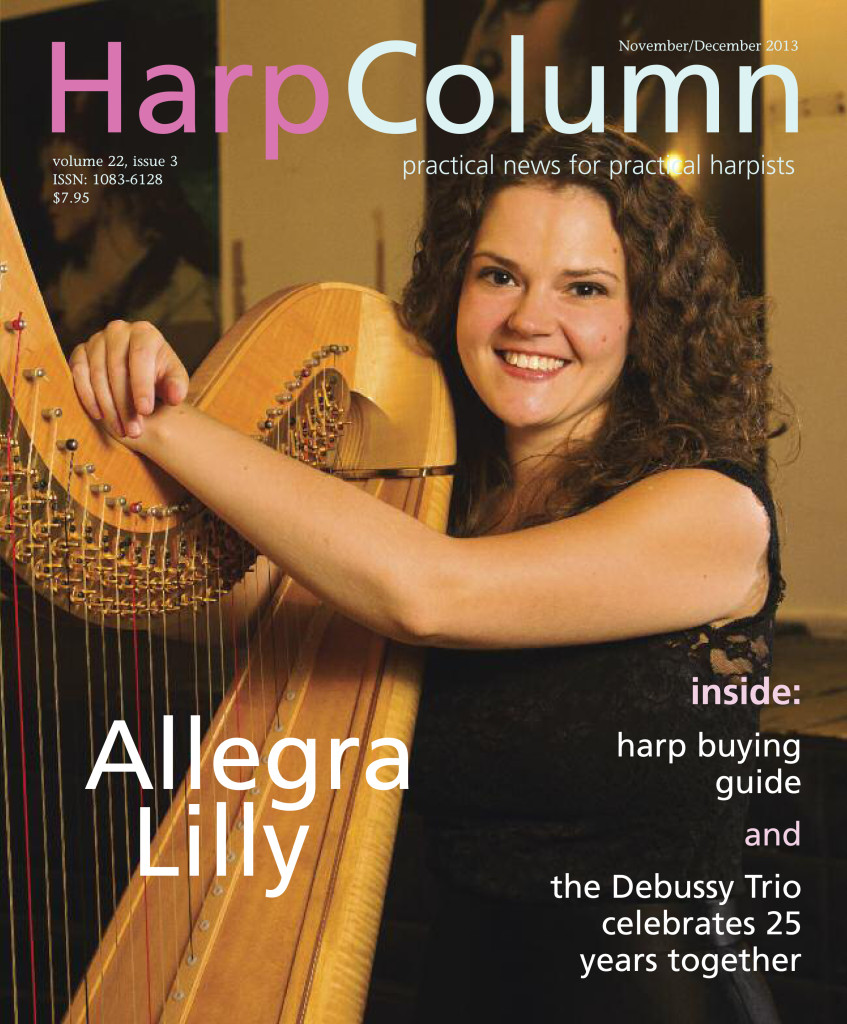- Allegra Lilly struck audition gold when she won the Principal Harp position with the St. Louis Symphony back in April. Find out her secrets to success.
- Allegra poses with renowned conductor Lorin Maazel at the Castleton Festival in Virginia in 2012.
- Legendery teacher Lucile Lawrence works with Allegra.
- A young Allegra at her first harp recital with her teacher Ruth Myers.
- Allegra and Boston Symphony Orchestra Principal Harpist Jessica Zhou are all smiles following a BSO performance of Symphony Fantastique at Carnegie Hall in 2012.
- Six harpists (clockwise from top left), Nancy Allen, Jessica Zhou, June Han, Ashley Jackson, Sivan Magen, and Allegra Lilly before a rehearsal of Wagner/Gilbert’s A Ring Journey with the New York Philharmonic earlier this year.
- Allegra enjoys a performance with fellow harpist Katie Ventura at Spoleto Festival USA in June.
—by Kristi Shade
She won the highly sought after Principal Harp position with the storied St. Louis Symphony Orchestra. But getting there was no walk in the park.
It doesn’t come around often, but when it does, harpists travel from all over to audition for it. It’s the coveted Principal Harp position in a symphony orchestra. A New York City colleague of mine, and fabulous harpist, Allegra Lilly, recently won the harp chair in the St. Louis Symphony. It is the second oldest symphony orchestra in the United States, preceded only by the New York Philharmonic, which is appropriate as Allegra has spent the past 10 years living, studying, and performing in New York and has even appeared with the New York Phil on several occasions. I caught up with Allegra as she was en route from New York City to St. Louis to begin a new chapter in her career. She gave me a candid and thoughtful look inside her experience and shared what she is most looking forward to in her new position.
Harp Column: First, congratulations on winning the St. Louis audition! That’s very exciting—you must be just thrilled.
Allegra Lilly: Yes, it’s honestly still very surreal. I dropped my harp off at the hall (they are going to be using my instrument), picked up my parts, my musician handbook and it still hasn’t really sunk in at all! You know, when you’ve dreamed about something your whole life and then it happens, it’s really hard to accept.
HC: That’s great. So, I want to back up a bit—can you tell me about your background in music? How did you get started on the harp? Are you from a musical family?
AL: Well, yes and no. My mom studied piano through the college level and was forced to give it up because of arthritis in her back. I grew up going to Detroit Symphony Orchestra concerts pretty regularly, especially their youth-oriented concerts. My sister and I both started music lessons at an early age (she’s three years older and now an accomplished soprano). She started violin when she was three and also studied piano. Of course, being the younger sister, I wanted to do everything my sister was doing, so I started piano lessons when I was five. I think as a result of all that time at the Detroit Symphony, I really got attached to the idea of playing harp. I just thought it was so magical and there is only one in the orchestra and you get these really beautiful, featured passages. I fell in love with it and I begged my parents for two or more solid years. Finally, they happened to meet a local harp teacher, Ruth Myers, and they got in touch with her about the possibility of starting harp lessons. So, I started with her when I was 7.
HC: After high school you moved to New York City to study with Nancy Allen at Juilliard.
AL: Yes, I moved to the city in 2003 and did my undergrad and master’s at Juilliard, and then I just kind of stuck it out doing gigs and plugging away at auditions.
HC: Did you always know you wanted to be an orchestral harpist? You talked about going to see the Detroit Symphony and being inspired by the harp, but did you always know that’s what you wanted to do?
[protection_text]
AL: I think at first, it was really just this nebulous idea that I wanted be a musician. I wasn’t sure yet what capacity I wanted that to be. In late middle school and early high school, I started playing with the Metropolitan Youth Symphony, which is a Detroit-area youth symphony, and I had this fabulous conductor there, Alan MacNair, whose wife, Mary, is a gifted harpist. So he really had a great sense of what repertoire would be best for harp and because he had a harpist around and there weren’t many of us in the area, he really programmed some great stuff for us to play. The first of which, was the Mahler 5 Adagietto. And, I mean, if there is ever a piece that will make you fall in love with playing with orchestra, that is it, without question. It’s almost hard not to weep in performance, it’s just so incredibly beautiful, and I think that was when I really started to have a concrete idea that that was specifically what I wanted to do.
HC: Mahler will do that to you.
AL: Yes, it’s been a love affair ever since.
HC: Jumping ahead to the St. Louis audition, can you tell me a bit about the audition process and if this process was different from other auditions you have taken in the past?
AL: I will say that, for sure, it was the best-run audition I have ever participated in. You could tell from the emails from Beth Paine, the personnel manager, that they had really thought about everything, right down to there being an area by the curb blocked off by cones. The crew would be out there to assist you and they were extremely careful with the harps. They were all wonderful. They had a harp technician, Ed Galchick, who was there to help with any problems. The instruments they had procured from Lyon & Healy were wonderful instruments. I personally brought my own instrument (my Salzedo), but from my understanding from everyone who did use the Lyon & Healy harps, they were really fantastic. The rounds were pretty long, I will say that. In the final round, each of the six of us played for 30 minutes. It was something like 10 excerpts and we played the Mahler 5 Adagietto with a string quartet and Maestro Robertson conducting. We also did the first half of the Ravel Introduction and Allegro with a sextet. And there was sight-reading! They always say there might be sight-reading but I’ve never been to another audition where they actually did it! It felt like they were really looking at all aspects of our musicianship. In that sense, it really felt like they made a good faith effort to hear everything that everyone had to present. I believe they allowed everyone who sent a resume to audition—I don’t think they really eliminated anyone during the resume process. So it was quite an extensive undertaking for them. And, they had a lot of people on the [audition] committee. They brought in Yolanda Kondonassis as a harp consultant, as they frequently do for auditions since there is less of an understanding of the instrument. The rest of the panel was made up of string players, principal winds, and principal percussion—it was about a 10-person panel. It was a long day. There were two preliminary days (rounds). I was invited to the semi-final round and therefore only had two rounds—the semi and final. There were six of us in the final round.
HC: How did you go about preparing for the audition?
AL: Ah, practice, practice, practice (laughs). I definitely studied scores and spent a lot of time listening, even to the things I thought I was really familiar with. I think there are two big things that help you when you are taking an audition. The first is listening—to everything, a million times, until you find yourself just having those pieces in your head all the time. Because when you’re sitting there on stage, you can have those moments of, “Oh no, I don’t know what I’m doing,” and if you just feel it, if the music has become so inherent that it’s in you, that helps you push through those moments. So that’s a big one and the other thing that I really think helped me quite a bit was playing a lot for my colleagues. Anybody who I could convince to come over and listen to my excerpts, I did it! I have a flute, harp, and viola trio called Hat Trick, with April Clayton (Flute Professor at Brigham Young University) and David Wallace (New York Philharmonic Teaching Artist). They gave me some great comments and really great feedback. I would give them the list of excerpts and have them call out pieces and I would play them. There was this one moment in particular, with an excerpt…I won’t mention which excerpt it was. David called it out and I said, “Oh, no, this one, I really hate this excerpt.” And he said, “No, you don’t; you love it! Play it like you love it or they are going to know that you hate it.” And he was right. I tried to remember that throughout the rest of the time I was practicing it and in the audition itself. You have to play it like you love it, even if it’s something you can’t stand. So I spent a lot of time playing for people. I have spent the last three years living with my best friend, bassist Ali Cook. There were days when the last thing I wanted to do was sit down and play these excerpts again. I would want to hang out with Ali, go watch Breaking Bad, do something else, just procrastinate! And Ali would say to me, “Ask yourself this, ‘How badly do you want this job?’” Any other time I wanted to do something else or I wanted to quit, I thought about how badly I wanted this job and I’d sit back down and play some more!
HC: That’s so true and applies to so many aspects of music and musicians’ lifestyles—keeping focused, spending hours alone and practicing.
AL: Yes, you need to keep your eyes on the prize. The process is always difficult, especially if you are as impatient as I am. Especially on those days when you sit down and it’s just not happening and your hands feel like alien hands. Those are the days that you really have to sit there and put the time in. You can’t just play through things when you sound good and think that that will do it.
HC: What is the most important thing you think you did to help prepare for this audition?
AL: Obviously practice time, you have to spend time behind the harp, and of course, listening and playing for other people. Your brain can play tricks on you in the moment, especially during an audition. It’s different from any kind of performing, it’s just a weird circumstance, especially rounds that are behind a screen, it feels so strange and it’s really good to get used to that feeling, to get used to walking in the room, sitting down and playing. One thing I tried to do, certainly with things like the Ravel Tzigane—wake up in the morning, brush my teeth, and play Tzigane! And if you can do it without warming up, certainly, hopefully, in an audition setting with ample time to warm up, it will be there.
HC: That’s exactly what everyone wants to do first thing in the morning, right?
AL: (Laughs) Exactly! Before coffee, Tzigane!
HC: How did past auditions help prepare you for this one? Did you change anything about your approach?
AL: That’s a great question. This is the sixth audition that I have taken. The first was Hartford and the second was the Boston Symphony—oh, I was so terrified. It’s really easy to build it up in your mind as either, “I have to win this job,” or, “I’m going to win this job,” or something like that. Not putting pressure on each audition has really helped. It’s so difficult as a harpist because we have so few auditions. And it’s really easy to think, “This next one will be it because it will be another year or two years until another audition for an ensemble of that level.” So I think I just went in with the idea that I wanted to represent myself the best way that I could. I wanted to show what I had learned and that I knew this music. With previous auditions, I had allowed myself to hope too much, and not that you should be hopeless, but with this audition I hadn’t gotten myself too set on the idea that I had to win this job because that’s really not the point. There will be more auditions, always, and no one is going to take away your harp-playing privileges if you go in and completely blow it! You can still play another day after that, it’s not the end of the world. So I think I kind of removed some of that pressure from myself, even though, as I said, I felt like I was ready. I’ve been really fortunate to get a lot of great experience in the last few years, especially with the Boston Symphony, and I think that really brought my playing to a completely different level and gave me the confidence to feel completely not intimidated by the process or by the idea of actually having the job. Certainly when I took the BSO audition back in 2008, I remember thinking, “Oh, I hope I don’t win this job, what would I do?” I didn’t think I could do it. At this point, I felt that if I won the job, I would be ready to do it. So, I was able to go in with no fear.
HC: You have performed quite frequently with some really incredible orchestras—The New York Philharmonic, The Boston Symphony Orchestra (as you just mentioned)—did performing with these ensembles change the way you play or play within an orchestra?
AL: Oh, absolutely, yes. I felt with both of those orchestras, there’s such a collective sense of timing. Everyone on stage seems to just psychically know where everyone else is going to place something. And I don’t want to say it is unrelated to what the conductor is giving, but with the BSO, they have been without a director for a while, and because they have had a different conductor each week, they need to rely on each other for that sense of timing. I remember feeling that I was kind of swimming in the first couple of rehearsals with them. I learned so much from sitting next to Jessica Zhou (BSO Principal Harpist), and Nancy Allen (New York Philharmonic Principal Harpist), learning to sense things more than expecting really to see them. It’s more a matter of listening to the music itself and thinking, where does it feel like it should be? Where does it feel like I should play? Instead of just kind of counting metronomically and staring at the page or staring at the conductor, it almost helps to just kind of, not literally close your eyes, but more so open your ears and listen to what’s around you and feel it within yourself. That completely changed how I played in orchestra. Also, every performance is slightly different. It’s not just a metronomic, strict performance. It’s a living, breathing thing and you have to breathe with it. That made such a huge difference. I’m so indebted to Jessica and Nancy to give me the opportunity to play with those orchestras.
HC: Wonderful. Along that line, do you have any particularly memorable performances or performing experiences with either of those groups?
AL: Well, I have a couple for different reasons. A quirky, funny one was with BSO, when they were on tour and they had done three programs at Carnegie. They were repeating the program, which was an all Wagner program, at the New Jersey Performing Arts Center. There was some sort of Wrestle Mania event transpiring in NYC that weekend and the traffic was horrendous. I was living in Harlem, so it was actually easier for me to drive and take the bridge rather than take the bus from Carnegie. So, I left at 5:30 p.m. and made it to the venue. No one else was there yet but I figured they were on their way, so I ate my dinner. It gets to be 6:30 and still no one had arrived. There were a couple of members of the administration that were there and they said the buses were dealing with some severe traffic and they were going to be delayed. Then it gets to be 7:15, 7:20, 7:25, and now I’m getting text messages from other harpists. We actually had four harps on that concert—it was Jessica (Zhou), June Han, Sivan Magen, and me. So, I start getting text messages: “Can you unpack the harps?” I unpack all the harps. “Can you tune the harps?” I tune all the harps. And meanwhile, there is no one onstage. There was a horn player and an oboist and that was it. There was this huge audience and I’m on stage in my concert black and I’m tuning all these harps. It gets to be 8:00, 8:15, 8:30, still no one there. They eventually made an announcement to the audience that the buses were on their way. It turns out one of the buses had been in a minor accident, just kind of a fender bender but of course that served to delay things even further. Eventually, everyone did arrive but it was decided that everyone changing into his or her clothes would take way too long. So, with the exception of the harpist, everyone else was in street clothes! Daniele Gatti was conducting, and he was in his regular clothes. It was really kind of cool. I think there were a handful of audience members who did not appreciate the delay and chose to leave and exchange their tickets, but for the most part, there ended up being a sense of camaraderie among the audience. I think the ones that stayed really appreciated the effort and that everyone came out in what they were wearing and put on a concert. I really thought it was a great performance, and certainly not something I will be forgetting anytime soon. Looking over at the BSO brass, winds, and concertmaster in jeans—it was great.
HC: That’s hilarious!
AL: I also had a very meaningful experience during the most recent concert I played with the BSO. I was fortunate enough to sub as Principal Harp for Mahler 4 because Jessica had her baby, Jasmine, about a week before the concert took place. It doesn’t seem real, this experience. I got to play Principal with Boston. And the (Mahler) part itself, it really is magnificent harp writing. Particularly the end of the third movement, is breathtakingly gorgeous. Getting to perform with an orchestra of that caliber, at all, under any circumstances, is a gift every time. But particularly under those circumstances, it was just magical—I’ll never forget it.
Another funny memory: I remember one time at Juilliard, I had food poisoning and I was sick all day, it was horrendous. We had a Juilliard orchestra concert that day and we were playing the StravinskyLe Chant du Rossignol with George Manahan conducting and Michelle Gott was playing principal and I was playing second. I didn’t think I was going to make it. I called the orchestra manager and said, “Pat, I don’t think this is going to happen, I can’t physically do it.” This was probably at 6:00 p.m., and it was an 8:00 p.m. concert. I called around to see if anyone knew the part—it’s a very involved piece, and both parts are really important. It’s certainly not something you want someone sight-reading. So I really tried to pull it together and finally around 7:00 p.m. I was no longer ill. So, I came to the hall, and I tuned and I saw Pat Posey (our orchestra manager) backstage and he said, “Okay, we have a bucket and a towel, right here by the stage door. If you feel like it’s going to happen, just stand up and walk offstage, very casually, like you’re supposed to! Pretend that maybe there is an offstage harp part.” I’ll never forget that—“there is a bucket offstage for you.” But, the show must go on.
HC: So did you have to use the bucket?
AL: I did not have to use the bucket, no (laughs).
HC: Then it was a success! Besides those memorable performances, what, in your overall musical life, has been a highlight for you?
AL: I think it was the moment I knew that I wanted to be a harpist. It was when I was 12 and I had won the Detroit Symphony Civic Orchestra’s concerto competition with the Debussy Danses. I was invited, as a result, to perform with the Detroit Symphony, which was my hometown symphony and had been so important in my earlier formative years. I remember being so excited. You know, when you’re a kid, it doesn’t even occur to you to be nervous, because you are just having a good time. And I just had such a great time playing that piece! That’s certainly in my top three pieces of all time and is perhaps my favorite piece for harp. Getting to play that with an orchestra that was already so important to me, that was really something.
HC: Incredible—what a fabulous opportunity to have at such a young age. What pieces are you looking forward to this season with the St. Louis Symphony?
AL: We are doing “Vysehrad,” from Ma Vlast (Smetana), it was on the audition list and they never actually asked for it. I learned it for the audition—what a beautiful piece! Also the GinasteraVariaciones Concertantes—a beautiful duo first between harp and cello, then with harp and bass. We are also doing Peter Grimes (Britten) and Bartok’s Concerto for Orchestra is always a favorite, although I’m sad I won’t get to play the spoons part! That’s the greatest second harp part.
HC: Absolutely! What are you most looking forward to with starting this new position and moving from New York to St. Louis?
AL: You know, I have an immediate answer but I feel it sounds untoward. But, I have to say financial stability. It’s so hard as a musician. There have been periods, especially since I’ve been out of school, which have been really difficult for me. I haven’t been insured for three years because I just couldn’t afford it. I would find myself getting sick, trying to weigh out, is it worth paying $200–300 to see a doctor or a specialist? Those are decisions that no one should have to make. Things like, can I afford to have my harp regulated this year? Can I afford new strings? I recently put new strings on my harp and I hadn’t had new strings on it in, I think, four years. It’s so much money and I just couldn’t do it and that’s even with the wonderful opportunities I did have to perform with these ensembles. It’s so difficult, especially in a place like New York. It’s such a give and take there because there are so many more wonderful opportunities but it’s so outrageously expensive, and it seems to get more expensive all the time whereas the jobs don’t pay any more so how’s that supposed to work? So, just knowing that I won’t have to wonder every month if I’m going to be able to pay my bills is really a wonderful thing. And that’s certainly not to distract from the main feature of having a job like this—I get to play with a wonderful orchestra virtually every week and do what I’ve always dreamed of doing. I can’t remember a time that I didn’t want to play the harp and to have the opportunity to do that and to really be able to make a solid living doing it is just…it’s a miracle! It’s a wonderful opportunity and I couldn’t be more grateful to have it. It’s so gauche to talk about money and people get really touchy talking about it but I think it’s important, especially for younger harpists to know, first of all, how difficult it really can be and also that there can be relief from that at some point if you really work for what you want to do and keep persevering.
HC: I think that’s a really important message. And as you’re saying, it’s not all about the money—you’re thrilled that you get to do what you love, and get paid for it.
AL: Yes, and so many musicians will tell you that that is what is so amazing about being a musician—the idea of being so passionate about something and someone actually paying you a salary to do it, to live a dream. That’s not to take away from any profession you may go into, but jobs in the arts, they are in this kind of special category where you are getting to explore your soul…for a living. That’s incredible. And that’s why you keep going when it gets really difficult and your bills are all late. It’s all worth it. It all feels worth it. And it has, all along, it’s not just winning the job. It’s those moments onstage at the end of Mahler 3 when you can barely keep it together because there’s so much beauty around you. Those are the moments that push me through.
HC: Yes, we are so lucky to know what it is like to enjoy what we do and be fulfilled from it.
AL: Yeah, heavy stuff!
HC: In a nutshell, what was it like to pack up and leave New York City and move to St. Louis?
AL: It was bittersweet. There are certainly things I loathe about New York, but it’s a spectacular place. It’s weird and crazy and beautiful. I would never have become the person that I am now if I hadn’t spent so much time in New York. It definitely made me a stronger person, a more independent person. It really broadened my horizons. It kind of opens you up to everything life has to offer, because it’s all there! New York has everything. I changed so much in the ten years that I was there. I’m grateful for everything that the city gave me and all the opportunities I was afforded while I was there. What a crazy place. I think as time goes by, I will look back at that place with love. As beaten down as I might have felt at times during those 10 years, it really made me mature. Not that I’m that mature! (laughs) It changed me for the better.
HC: To end, what is your favorite orchestral piece to perform—if you can pick just one!
AL: Oh that’s so hard, and I think about this a lot because I have a lot of favorites. I really love Mahler’s harp writing and then on the other spectrum, I love Debussy and Stravinsky. I really love Le Chant du Rossignol. Both harp parts are just awesome. Any friend of mine who reads this will laugh because they know I am obsessed with The Wooden Prince. It’s this Bartok piece that no one knows! Everyone knows the Concerto for Orchestra and The Miraculous Mandarin, but The Wooden Prince is this epic, amazing piece of music and I had never even heard of it before playing it with BSO a couple of years ago. It’s incredible. There’s a recording of the Chicago Symphony with Boulez conducting—if you take nothing else from this article, go get that recording, get some amazing speakers and listen to it! It is spectacular. That’s been my obsession for a couple of years and will probably continue for several more. I am preaching the gospel of The Wooden Prince to the world.
HC: I’m sure Bartok is somewhere thanking you for that!
AL: No problem, Bartok.
HC: Well, we wish you all the best—it sounds like quite an exciting year coming up for you. Congrats again, you absolutely deserve it. •






